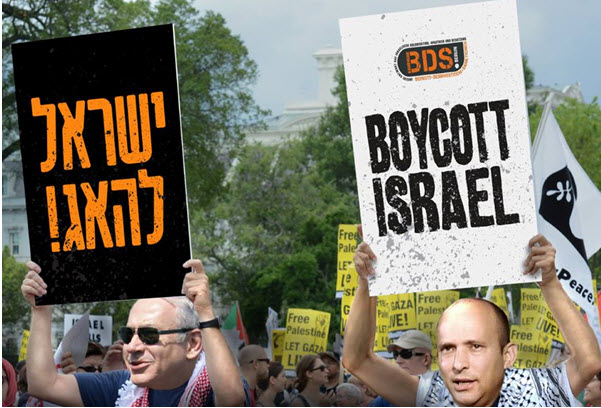Israeli Primer Minister Benjamin Netanyahu reportedly began on Sunday, December 26, the process of limiting diplomatic relations with countries that voted in favor of the resolution passed by the UN Security Council last week.against Israeli settlement activity in the occupied Palestinian territories.

Photomontage released by Peace Now: Netanyahu: “Israel to the International Court in the Hague”, Education Minister Naphtali Bennet: “Boycott Israel”
According to Israeli newspaper Haaretz, Netanyahu ordered Israel’s Foreign Ministry to limit diplomatic cooperation with countries that had voted in favor, as a senior Israeli official told Haaretz that Israeli ministers would be encouraged to limit travel, and to restrict the foreign ministers from visits to Israel. While the foreign ministers would “not be received” at Israel’s Foreign Ministry in Jerusalem, the Israeli ambassadors to these countries would continue their visits to the respective countries in order to maintain contact, Haaretz reported.
Resolution 2334, which was passed after 14 Security Council member states voted in its favor while the United States abstained, was drafted by Egypt alongside Palestine. The resolution demands that Israel completely cease all settlement activities in the occupied Palestinian territory, including East Jerusalem, while emphasizing that the establishment of settlements by Israel is in direct violation of international law and they therefore bear no legitimacy. Israeli far-right leadership has reacted hysterically since the UNSC approved the resolution, with Netanyahu saying that Israel “would not abide by the terms” of the “shameful anti-Israel resolution,” and reportedly summoned the ambassadors of the UN Security Council member states to personally reprimand each of them on Christmas day. Israeli Channel 10 television said Sunday that Netanyahu fears the Middle East Quartet — the US, UN, Russia and EU — will coordinate positions at the Paris summit, and then return to the UNSC.
On Monday, Palestinian Authority President Mahmoud Abbas (Abu Mazen) expressed the hope that the upcoming Middle East conference in France will set in place a mechanism to end Israel’s settlement construction in East Jerusalem and the West Bank. Abbas’s public remarks were his first since Friday’s United Nations Security Council resolution, which condemned Israeli settlements as a “flagrant violation” of international law. Abbas told a meeting of his Fatah party late Monday that the resolution “paves the way for the international peace conference” scheduled to take place in Paris on January 15.
A day after the vote, Abbas hailed the UN resolution as setting “the legal basics for a solution,” as it “reiterated that Israeli settlement is illegal.” “The world said its word that settlement in the Palestinian territories occupied in 1967, including East Jerusalem, is illegal,” Abbas said Saturday night, while calling on Israel “to sit together at the negotiation table to discuss all the outstanding issues between us and resolve them with good intentions…we are neighbors on this holy land and we want peace.”
Related:
Security Council Calls on Israel to Cease All OPT Settlement Activities


